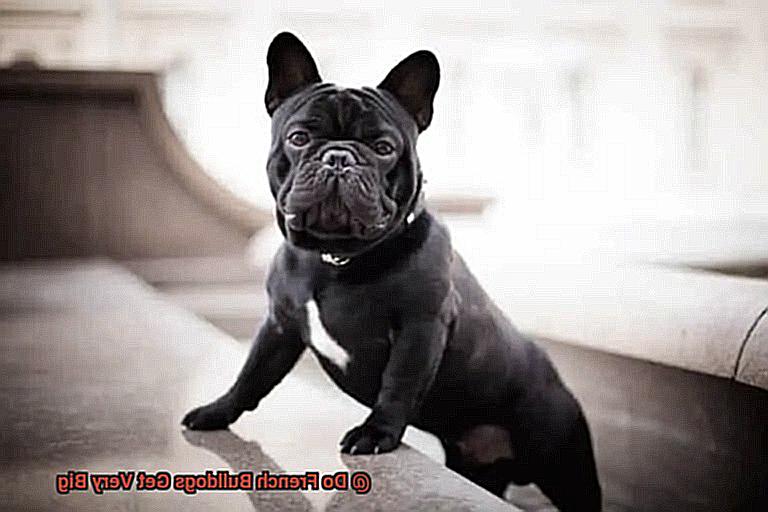Do French Bulldogs Get Very Big?
Get ready to embark on a journey through the enchanting world of French Bulldogs. Today, we’re here to answer one burning question: “Do French Bulldogs get very big?”
Sure, at first glance, these little guys might seem pint-sized and pocket-friendly. But let me tell you, their size is no indication of their larger-than-life personalities. French Bulldogs are the ultimate class clowns, with enough charm and character to fill a stadium. So buckle up and prepare to be amazed as we unravel the secrets behind their unique proportions.
In this blog post, we’ll explore what makes Frenchies so darn adorable and whether their size fits perfectly into your fur-baby parenting dreams. So grab a cuppa, settle in, and let’s dive right into the fascinating world of French Bulldog dimensions.
Do French Bulldogs get very big
Contents
- 1 Do French Bulldogs get very big
- 2 Factors That Can Affect the Size of a French Bulldog
- 3 Are There Ways to Make a French Bulldog Bigger?
- 4 The Benefits of Keeping Your French Bulldog at a Healthy Weight
- 5 How to Monitor Your French Bulldog’s Weight
- 6 The Importance of Proper Nutrition for Your French Bulldog
- 7 Exercise and Activity for Your French Bulldog
- 8 Potential Health Problems Associated With an Overweight French Bulldog
- 9 Why You Should Respect the Natural Size and Build of the Breed
- 10 Conclusion
If you’re wondering whether these adorable pups get very big, you’ve come to the right place. In this blog post, we’ll explore why French Bulldogs typically don’t reach massive sizes and why their petite stature adds to their charm. So, grab a cup of café au lait and let’s dive into the world of French Bulldog sizes.
Genetics and Selective Breeding:
French Bulldogs have been selectively bred over generations to maintain their small to medium-sized build. Thanks to careful breeding practices, these pups have become a beloved companion breed known for their compact and muscular physique. Their genetics play a significant role in determining their size, ensuring they stay within a specific range.
Average Size:
On average, adult French Bulldogs stand around 11 to 12 inches tall at the shoulder, making them perfect lap-sized dogs. They typically weigh between 16 to 28 pounds, which is just right for snuggling up on the couch or joining you on outdoor adventures.
Individual Variations:
Just like humans, French Bulldogs can have slight variations in their size. Some may be smaller or larger than the average range due to their individual genetic makeup. However, it’s relatively rare for French Bulldogs to grow significantly bigger than the typical size mentioned earlier.
Factors Influencing Size:
While genetics play a significant role, other factors also contribute to a French Bulldog’s size. Proper nutrition and regular exercise are crucial in maintaining a healthy weight for your Frenchie. Consult with your veterinarian to determine the best diet and exercise plan tailored to your pup’s needs.
Gender Differences:
In general, male French Bulldogs tend to be slightly larger than females. However, the difference is not significant enough to classify them as “very big.” It’s more of a charming distinction that adds character to each pup. So whether you have a boy or girl Frenchie, their size will still fall within the small to medium-sized category.
Emphasizing Overall Well-being:
Rather than obsessing over their size, it’s important to focus on your French Bulldog’s overall well-being. Providing them with a balanced diet, regular exercise, and routine veterinary care is essential for maintaining their health and happiness. Remember, a happy Frenchie is a healthy Frenchie.
French Bulldogs may not get very big compared to some other breeds, but their compact size is part of what makes them so endearing. With their sturdy build and affectionate nature, they are the perfect companions for both city dwellers and country adventurers.
Factors That Can Affect the Size of a French Bulldog
If you’ve ever wondered why these adorable pups come in different sizes, you’re in for a treat. In this blog post, we’ll explore the factors that can influence the size of a French Bulldog. From genetics to nutrition, we’ll uncover the secrets behind their petite frames and provide you with valuable insights to ensure your furry friend thrives.
Genetics:
Just like humans, French Bulldogs inherit certain traits from their parents. The size of a French Bulldog can be influenced by its genetic makeup. If both parents are on the larger side, there is a higher chance that their offspring will also be bigger. Conversely, if the parents are smaller, the puppies are likely to be smaller as well.
Gender:
In general, male French Bulldogs tend to be larger than females. Males can reach a height of 11 to 12 inches at the shoulder and weigh between 20 and 28 pounds. Females, on the other hand, are usually slightly smaller, measuring around 10 to 11 inches in height and weighing between 16 and 24 pounds.
Nutrition:
Proper nutrition is key to ensuring healthy growth in French Bulldogs. Providing a balanced diet with appropriate portions is essential. Overfeeding or underfeeding can have an impact on their size. Consult with a veterinarian to determine the right type and amount of food for your French Bulldog based on its age, activity level, and overall health.
Health:
Certain health conditions can affect the growth and size of French Bulldogs. Hormonal imbalances or thyroid issues can lead to stunted growth or excessive weight gain. Regular veterinary check-ups are crucial for monitoring your dog’s overall health and addressing any potential concerns that may impact its size.
Exercise:
Adequate exercise is essential for maintaining a healthy weight and physique in French Bulldogs. Regular physical activity helps prevent obesity and keeps their muscles toned. However, it’s important to avoid excessive exercise or intense physical activities, especially during hot weather, as French Bulldogs are prone to respiratory issues due to their flat faces.
Now that you’re armed with knowledge about the factors that can affect the size of a French Bulldog, you can ensure your furry friend thrives. Remember, genetics, gender, nutrition, health, and exercise all play a role in determining their size.
By providing proper care and attention, you can enjoy the company of your French Bulldog companion for years to come. À bientôt.
Are There Ways to Make a French Bulldog Bigger?
While we cannot drastically change their size, there are ways to promote healthy growth in French Bulldogs. In this article, we will explore some essential factors that contribute to their growth and well-being.
Nutrition:
Proper nutrition is crucial for the healthy growth and development of your French Bulldog. Provide them with a balanced diet consisting of high-quality dog food specifically formulated for French Bulldogs. This ensures they receive the necessary nutrients for optimal growth without overfeeding, which can lead to obesity.
Exercise:
Regular exercise is important for overall health and can support your French Bulldog’s growth. Engage them in daily walks, play fetch, or allow them to run in a safe area. However, it is important to avoid excessive exercise, especially in puppies, as their respiratory system is delicate.
Veterinary Care:
Regular visits to the veterinarian are essential for monitoring your French Bulldog’s growth and addressing any health concerns. Vaccinations, preventive care, and proper dental hygiene are key aspects of maintaining their overall health and well-being.
Socialization:
Interacting with other dogs and people from an early age can help promote healthy growth in French Bulldogs. Socialization not only helps them develop good behavior but also encourages physical activity and mental stimulation.
Mental Stimulation:
Providing mental stimulation through toys, puzzles, and training sessions can contribute to a healthy and well-rounded French Bulldog. Mental exercise is just as important as physical exercise for their overall growth and development.
The Benefits of Keeping Your French Bulldog at a Healthy Weight
French Bulldogs are adorable little pups that bring so much joy to our lives. But did you know that they are prone to obesity? That’s right, those cute little rolls can actually be a health risk for our furry friends. That’s why it’s crucial to keep your French Bulldog at a healthy weight. Let’s dive into the benefits of maintaining a proper weight for your pup.
- Prevents Joint Problems: French Bulldogs are prone to joint issues like hip dysplasia and arthritis. Carrying excess weight puts added stress on their joints, making these problems even worse. By keeping your French Bulldog at a healthy weight, you can reduce the strain on their joints and help prevent these painful conditions.
- Reduces the Risk of Heart Disease: Obesity in French Bulldogs can lead to heart problems such as high blood pressure and heart disease. Keeping your pup at a healthy weight lowers the risk of these cardiovascular issues, ensuring that their ticker keeps ticking for years to come.
- Improves Breathing: French Bulldogs already have compromised breathing due to their unique facial structure. Obesity can exacerbate this problem, making it even harder for them to breathe. By maintaining a healthy weight, you can help ease their breathing difficulties and improve their overall quality of life.
- Increases Energy Levels: A healthy weight means more energy for your French Bulldog. They’ll be able to run, play, and enjoy all the activities they love without getting tired too quickly. Plus, regular exercise helps keep their muscles strong and their minds sharp.
So how do you keep your French Bulldog at a healthy weight? It’s simple – a balanced diet and regular exercise. Be mindful of portion sizes and avoid overfeeding or excessive treats. Consult with your veterinarian to determine the appropriate amount of food and exercise for your pup’s specific needs.
How to Monitor Your French Bulldog’s Weight
French Bulldogs are adorable, compact companions that bring joy to our lives. However, just like any other breed, they need proper care and attention to maintain a healthy weight. In this article, we will explore the importance of monitoring your French Bulldog’s weight and provide practical tips on how to keep them fit and happy.
Establishing a Baseline:
Regular weighing is essential to monitor your French Bulldog’s weight. Weigh them once a month on the same scale and at the same time of day. Tracking their weight over time will help you identify any fluctuations or significant changes.
Assessing Body Condition:
Visual inspection and body condition scoring are important tools in monitoring your French Bulldog’s weight. A healthy French Bulldog should have a visible waistline when viewed from above, and you should be able to feel their ribs easily without excessive fat covering them.
Providing a Balanced Diet:
Consult with your veterinarian to determine the appropriate portion sizes and feeding schedule for your French Bulldog based on their age, activity level, and overall health. Avoid overfeeding and limit treats to prevent excessive weight gain.
Exercise for a Healthy Weight:
Regular physical activity is crucial for maintaining your French Bulldog’s weight. Opt for activities that are not too strenuous or involve excessive heat due to their brachycephalic nature. Short walks, gentle play sessions, and mental stimulation exercises are great options.
Regular Veterinary Check-ups:
Schedule regular check-ups with your veterinarian to monitor your French Bulldog’s weight and overall health. They can provide guidance on diet, exercise, and address any concerns you may have.
The Importance of Proper Nutrition for Your French Bulldog
As a proud owner of a French Bulldog, it is crucial to understand the importance of providing them with proper nutrition. These delightful little dogs have specific dietary needs that must be met to ensure their good health and prevent weight gain. Let’s explore why proper nutrition is essential for French Bulldogs and how you can ensure they receive the best diet possible.
Prevents obesity and associated health problems
French Bulldogs are notorious for their love of food, and their charmingly round bellies are a testament to this. However, this breed is prone to obesity, which can lead to a host of health issues, including joint problems, heart disease, and respiratory difficulties. By feeding your French Bulldog a balanced and nutritious diet, you can help them maintain a healthy weight and reduce the risk of these complications.
Monitor food intake
French Bulldogs have a tendency to overeat if given the chance. It is important to monitor their food intake and provide portion-controlled meals. Feeding them high-quality dog food that is appropriate for their age, size, and activity level is crucial. Avoid feeding them table scraps or human food, as these can be high in fat and unhealthy for them.
Balanced diet
A diet that is rich in protein and low in carbohydrates is recommended for French Bulldogs. Protein helps support muscle development and repair, while limiting carbohydrates helps prevent excessive weight gain. Look for dog food that lists high-quality sources of protein, such as chicken or fish, as the main ingredients.
Smaller, more frequent meals
French Bulldogs should be fed smaller, more frequent meals throughout the day rather than one large meal. This helps prevent digestive issues such as bloating and promotes a steady metabolism. You can consult with your veterinarian or a canine nutritionist to determine the appropriate feeding schedule for your furry friend.
Hydration is key
Providing your French Bulldog with fresh water at all times is essential for their overall health and hydration. Adequate water intake helps regulate body temperature, aids digestion, and prevents urinary tract infections. Always ensure that your furry friend has access to clean and fresh water throughout the day.
Exercise and nutrition go hand in hand
Proper nutrition goes hand in hand with regular exercise to maintain a healthy weight for your French Bulldog. Engage them in daily walks, play sessions, or interactive toys to keep them active and prevent obesity. Remember that French Bulldogs are brachycephalic breeds, so avoid exercising them in extreme heat or humidity to prevent respiratory distress.
Consult with professionals
Consulting with a veterinarian or a canine nutritionist can provide valuable guidance in determining the best diet plan for your French Bulldog. They can assess your dog’s specific nutritional needs and recommend the appropriate dog food brands and portion sizes.
Exercise and Activity for Your French Bulldog
Are you looking for fun and effective ways to keep your furry friend in shape? Well, look no further. In this blog post, we’ll dive into the world of exercise and activity for your French Bulldog. From daily walks to interactive toys, we’ve got you covered. So grab a treat for your pup and let’s get started.

Daily Walks:
First things first, let’s talk about the classic exercise routine – daily walks. French Bulldogs love going for strolls and exploring their surroundings. Plus, it’s a great opportunity for them to socialize with other dogs and humans. Aim for at least 30 minutes to an hour of walking each day. Don’t forget to keep your Frenchie on a leash to ensure their safety and prevent any mischief.
Fetch Fun:
Next up, let’s amp up the exercise level with some fetch fun. French Bulldogs have a natural instinct to chase after toys, so why not use that to your advantage? Grab a ball or a favorite toy and start throwing. Not only will this provide physical exercise, but it will also engage their minds as they retrieve the toy. It’s a win-win situation.
Puzzle Games:
Speaking of engaging their minds, interactive toys and puzzle games are perfect for keeping your French Bulldog mentally stimulated. These types of activities challenge their problem-solving skills and prevent boredom and destructive behavior. Look for toys that require them to figure out how to get treats or toys out of them. It’s like a mental workout for your Frenchie.
Splish Splash in the Water:
Did you know that swimming is an excellent low-impact exercise for French Bulldogs? It’s true. Their short snouts make it difficult for them to regulate body temperature, so swimming is a great way to keep them cool during hot summer months. Just make sure to introduce them to the water slowly and use a life jacket if necessary. Safety first, always.
Hot Tips for Hot Days:
Speaking of hot summer months, it’s crucial to be mindful of the temperature when exercising your French Bulldog. Their adorable snub noses make them more prone to overheating, so avoid exercising them during the hottest parts of the day. Instead, opt for early morning or evening walks when it’s cooler. And don’t forget to bring a water bottle and take frequent breaks for hydration.
Tailor-Made Exercise:
Remember, every French Bulldog is unique, and their exercise needs may differ. Some may have boundless energy and require more activity, while others may be content with less. Pay attention to your pup’s energy levels and adjust their exercise routine accordingly. A happy and healthy Frenchie is a well-exercised Frenchie.
Potential Health Problems Associated With an Overweight French Bulldog
We all love our furry friends, but sometimes those irresistible puppy dog eyes can lead to overindulgence. However, it’s important to be aware of the potential health risks associated with an overweight French Bulldog. In this blog post, we’ll explore the impact of excess weight on our beloved pups and why maintaining a healthy body condition is crucial for their well-being.
Breathing Difficulties:
French Bulldogs are already predisposed to respiratory problems due to their adorable squished faces. However, when they carry extra weight, it puts increased pressure on their airways, making breathing even more challenging. Imagine trying to breathe with a backpack full of bricks on your chest – not pleasant, right? This can lead to further complications and discomfort for your Frenchie.
Joint Problems:
Excess weight places additional strain on your French Bulldog’s joints, leaving them susceptible to conditions such as arthritis and hip dysplasia. These painful conditions can significantly impact your pup’s mobility and quality of life. Let’s keep them jumping for joy by maintaining a healthy weight.
Heart Disease:
A heavy burden indeed. Carrying excess weight puts a strain on your Frenchie’s heart, making it harder for it to pump blood efficiently. This can lead to serious conditions like congestive heart failure, which no pet parent wants their furry friend to experience.
Skin Problems:
Ah, those delightful folds of skin that make our Frenchies so unique. However, when they are overweight, these skin folds can become more pronounced and prone to infections. Regular cleaning and monitoring are essential to prevent any unpleasant skin irritations or infections from occurring.
Diabetes:
Just like humans, overweight dogs can develop insulin resistance, leading to high blood sugar levels and diabetes. This condition requires careful management through diet and medication to ensure your Frenchie’s overall health and happiness.
Why You Should Respect the Natural Size and Build of the Breed
As a proud French Bulldog owner, it is essential to understand and respect the natural size and build of this beloved breed. French Bulldogs are known for their unique appearance, characterized by a compact body, muscular build, and bat-like ears. Respecting these distinctive traits not only upholds the breed standard but also ensures the overall health and well-being of your furry companion.
Maintaining Optimal Health and Well-being
Respecting the natural size and build of the French Bulldog breed is crucial for their overall health. Breeding for larger sizes can have detrimental effects on their physical well-being. French Bulldogs are prone to several health issues, including respiratory problems due to their short snouts and compact airways. Breeding for larger sizes can exacerbate these issues, resulting in difficulties breathing and increased susceptibility to heatstroke.
Avoiding Potential Health Risks
Breeding for larger sizes in French Bulldogs can lead to a range of health risks. Overweight dogs are more likely to experience joint problems such as hip dysplasia, which can cause pain and mobility issues. Additionally, excessive weight can strain the heart, leading to cardiovascular problems. By respecting the natural size and build of the breed, you can help minimize these potential health risks.
Preserving the Breed’s Unique Characteristics
The natural size and build of the French Bulldog are what make them so special. Their compact bodies and muscular builds are part of their breed standard and contribute to their charm and distinctiveness. By respecting these characteristics, you contribute to preserving the breed’s unique identity.
Responsible Breeding Practices
Responsible breeders prioritize maintaining the natural size and build of the French Bulldog breed. They carefully select breeding pairs that adhere to the breed standard, ensuring that offspring inherit the desired traits. Responsible breeders also conduct health screenings to reduce the risk of passing on genetic disorders. By supporting responsible breeding practices, you play a vital role in maintaining the breed’s natural size and build.
Enhanced Quality of Life
Respecting the natural size and build of the French Bulldog breed ultimately enhances their quality of life. Dogs that are within their breed standard are more likely to have better physical health, increased mobility, and improved overall well-being. They can participate in activities such as walks, playtime, and exercise without excessive strain or discomfort.
Conclusion
French Bulldogs, despite their adorable appearance, do not grow to be very big.
In fact, they are known for their compact and muscular build. These pint-sized pups typically weigh between 16-28 pounds and stand about 11-12 inches tall at the shoulder.
Their petite stature makes them perfect for apartment living or cuddling up on your lap. Don’t let their small size fool you though – French Bulldogs exude charm and personality in abundance.
So, if you’re looking for a companion that won’t take up too much space but will fill your life with love and laughter, the French Bulldog is the perfect fit.




